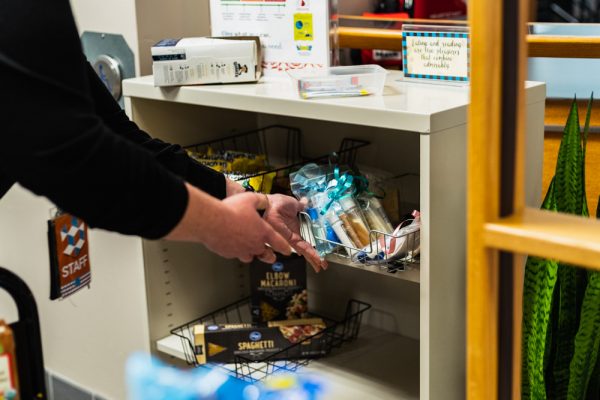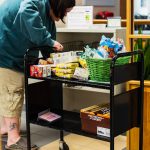
Preparing a basket for the snack pantry. Torrence Williams | Washtenaw Voice
By Sabrina Martell
Contributor
New to this school year, The Writing Center and the Richard W. Bailey Library are two areas on campus where students in need can get snacks.
The Bailey Library maintains a “snack shack” and the Writing Center is home to a “snack station.” The snack shack and snack station are near the entrances of their respective locations.
The individual snack pantries were independent projects by both the Bailey Library and Liberal Arts department and are supported by staff and student donations.
Both snack pantries accept pre-packaged and fresh donations. Both locations see several students each day. Writing Center director Tom Zimmerman said that it was because of its “high traffic” that the Writing Center was chosen as a location for a snack pantry.
These snack pantries are no-questions-asked pantries, meaning students can just take the snacks without having to speak with anyone about their situation or fill out any forms.
“We’re aware that there is a problem out there. It may not apply to some of our students. It almost certainly applies to some, but we don’t know how many,” Zimmerman said.
The issue of food insecurity among students is especially important to the Writing Center, Zimmerman said “because the Writing Center is a place where people share a lot of their lives.”
The Bailey Library’s Snack Shack is supplied by staff donations, but is also open to student donations.
- Bethany Kennedy setting a basket of toiletries in the snack pantry. Torrence Williams | Washtenaw Voice
- Preparing a basket for the snack pantry. Torrence Williams | Washtenaw Voice
“If someone wanted to leave some donations in the snack shack, they wouldn’t have to tell us—it’s just open,” said Bethany Kennedy, director of access services at the Bailey Library.
In the past, Kennedy said, the library did not allow students to bring food into the library. What changed this rule was the realization that some students spent several hours at a time in the library or skipped their meals to study between classes. The staff at the library didn’t want students to have to choose between studying and eating, Kennedy said.
“I think this is just an extension of that,” Kennedy said. “We really want students to be comfortable and to be healthy and also able to utilize the resources here at the Bailey Library.”
These new snack pantries accompany the campus’ Emergency Food Pantry, a pantry dedicated to providing students with full meals, beyond just snack food. According to coordinator of the Emergency Food Pantry, Carol Tinkle, the food pantry supplies students who cannot afford to get groceries with a possibility of four bags of food and hygiene items per semester over the course of two visits. Students who utilize the Emergency Food Pantry must consult with a case manager before doing so.
“I just think food insecurity is an issue,” Tinkle said, “And it’s been brought to everyone’s attention.”




